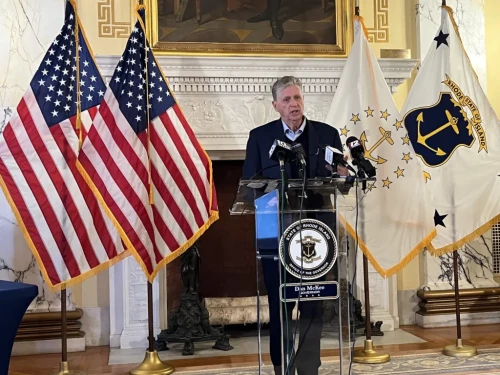Recent cuts to federal Medicaid funding could have serious consequences for tens of thousands of Rhode Islanders who rely on Medicaid for their health insurance. The problem is especially dire in Central Falls, according to a new report, where about half the population is on Medicaid.
The report’s co-author is Dr. Michael Fine, Chief Health Strategist for Central Falls and the former director of the Rhode Island Department of Health. He spoke with Morning Host Luis Hernandez about how the state’s health care system could be impacted by an influx of uninsured Rhode Islanders.
Interview highlights
On how many Rhode Islanders could lose health insurance coverage as a result of federal Medicaid cuts
Michael Fine: The changes to Medicaid are coming from the so-called “Big Beautiful Bill”, which requires reauthorization every six months. I think it requires it in person, a process that will make reauthorization more difficult. It is expected that some, maybe many, people with Medicaid won’t be able to meet that standard and will lose their eligibility as a result.
Most of those people are single adults over 18 in what’s called the expansion population; the people who were added to Medicaid after the Affordable Care Act of 2010. We think we’re going to see in Rhode Island the loss of somewhere between 33,000 and 50,000 Rhode Islanders on Medicaid. In Central Falls, that looks like somewhere between 1,200 and 2,000 people on Medicaid. The number we use for projection is about 1,600, right in between.
On how the loss of health insurance impacts a Rhode Islander’s ability to access primary care
Fine: We’ve already got challenges to access, just in terms of the supply of our primary care physicians, nurse practitioners and PAs (physician assistants). We just don’t have enough. Compounding that will be the number of people who lose health insurance who feel like they can’t afford to go to the doctor.
I can see two major consequences of that. The first is that people will wait until it’s too late and then show up at the emergency department for their care, overloading our already overloaded emergency departments. Some will show up using the emergency department instead of primary care, which boosts the cost of health care for all of us. Some will show up when they’ve been sick for a long time, which means they will show up much sicker than they need to be, which puts everybody’s health at risk and means they will have more serious illnesses that require more serious and expensive intervention.
The other major concern is that some may not seek health care at all. And we may see the kinds of diseases that we haven’t seen in a long time because we’ve always been a state where lots of people have access to health care. These are the kinds of things that worry me most.
On how undocumented Rhode Islanders are impacted by documented Rhode Islanders’ loss of health coverage
Fine: When documented residents lose their coverage, they go to the emergency department and that fills up the emergency department itself. That means that our community health centers, which have traditionally cared for at least some – about a third – of the undocumented population, will also be filled and stretched by the people who no longer have health insurance because technically, the community health centers provide access to people regardless of their ability to pay, though they’re constrained by their workforces. It all compounds. If there are lots of people who are uninsured and aren’t seeking care, they spread the kinds of diseases that undocumented people can get, and that puts both the undocumented community and the community at large at greater risk.
What the state can do to help at-risk Rhode Islanders maintain their health insurance
Fine: The state, for example, could find a way to buy primary care per person, per month, or per person, per year directly from providers of primary care. That’s actually something that Scituate, Rhode Island, has been doing for 25 years, making Scituate the first place in the United States where everybody’s guaranteed access to primary medical and dental care. That’s one option.
The state could – and it won’t happen fast, but as quickly as it can – really turn up the heat on training new primary care clinicians. We could front-burner that. It’s a little expensive, but it’s nowhere near as expensive as the cost of the illness and disease that I think we’re looking at.







